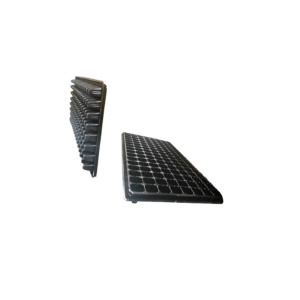






| Attribute | Details |
|---|---|
| Title | Planting Trays 66 holes |
| Price | 230 |
| Description |
Benefits of Agriculture and Nursery Plating Trays
Efficient Space Usage: Plating trays allow for efficient use of space by organizing multiple plants in a compact area. Whether you're germinating seeds, transplanting seedlings, or growing microgreens, these trays help maximize limited space in greenhouses, nurseries, or home gardens. Enhanced Root Development: With individual compartments or cells, plating trays provide optimal root space for young plants. The structure encourages strong and healthy root systems, which helps plants grow faster and adapt better to their final planting locations. Water Management: Many plating trays are designed with drainage holes or water reservoirs that help manage moisture levels. Proper water management reduces the risk of root rot and other diseases while ensuring that plants receive consistent hydration. Improved Transplanting: Plants grown in plating trays can be easily transplanted into larger pots or the ground without disturbing the roots. The individual cells or compartments allow the plants to develop in a manner that makes them easier to handle and transplant without causing damage to their delicate root systems. Better Germination Rates: Using plating trays ensures that seeds receive consistent moisture, temperature, and airflow, which are critical for good germination. This helps boost germination rates and produces healthier seedlings for later transplanting. Disease Control: By isolating plants from one another in individual compartments, plating trays reduce the spread of soil-borne diseases between plants. This is particularly helpful in preventing issues like damping-off or fungal infections. How to Use Agriculture and Nursery Plating Trays Fill the Trays: Start by filling the cells or compartments with a high-quality potting mix or seed-starting medium. Ensure that the medium is lightly compacted to provide good support for seedlings but not too dense to prevent water drainage. Plant Seeds or Insert Cuttings: For seed starting, place seeds in the appropriate depth in each cell, following the recommended planting instructions. For propagation, insert your plant cuttings into each cell or compartment and cover lightly with soil or rooting medium. Water Properly: After planting, gently water the trays to ensure that the soil is moist but not soggy. Ensure that the water drains properly, especially if your tray has drainage holes. Some trays also come with water reservoirs to maintain moisture levels consistently. Provide Adequate Light: Place the trays in a location with adequate light for the plants. This could be under grow lights if you're growing indoors or in a greenhouse with natural sunlight. Monitor Growth: Keep an eye on the plants as they grow. Ensure they have enough space to develop healthy roots and that the trays are kept clean and free from pests. Transplanting: Once your seedlings are large enough and have developed a strong root system, they can be transplanted into larger pots or directly into the ground, depending on the plants. . |
Agriculture and nursery plating trays are essential tools for promoting healthy plant growth and efficient nursery management. They provide the right conditions for seedling development, making them perfect for propagating seeds, growing young plants, and organizing plants in limited space. Whether you're growing vegetables, flowers, herbs, or other crops, these trays offer the benefits of increased efficiency, healthier root systems, and improved overall plant quality.